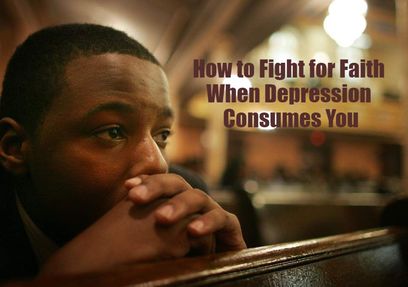
The way that the church has dealt with depression in the past is the same way that it has dealt with other difficult subjects like sex and money. We just don’t talk about it. Because the church culture says that now that we are in Christ everything should be perfect in our lives. If it’s not, then there is something wrong with our faith. Because of that people with real issues never talk about them and never deal with them.
Because there has been a prohibition of talking about certain things or not expressing our feelings when we are hurting in certain areas like money or sex we often putting lipstick on a pig so to speak. We are masking how we hurt so we don’t get help. I use to hear some old time preachers and old time mothers talking about the church being a hospital well if you can’t talk about your sickness what kind of hospital is it? Is it only one that deals with the common cold or a stubbed toe and not drug addiction or sex addiction, or depression?
The church has a problem talking about depression because we somehow believe that Christians should not get depressed. Talking about it can be uncomfortable because many of our church leaders don’t know a lot about it so we in the church don’t talk about it.
The fact is that we do have people who are depressed and with other issues who never talk about them. The church should be a place of healing but it is often a place of cover up. When people don’t address their issues what happens is somebody eventually finds out and it becomes rumor and gossip, the leadership finds out about it and asks that they step down from leadership or leave until the problem is solved, or they just leave because they can no longer keep up the charade.
The following is the full article from The Christian Post article written by Stoyan Zaimov, Christian Post Reporter | Oct 2, 2018 4:17 PM

JD Greear Criticizes the Way Churches Treat Depressed Christians; Explains What Believers Need
*Bold emphasis mine
Megachurch Pastor J.D. Greear has criticized the positivity-only way some churches handle depressed Christians, explaining that believers need to know God is with them through their pain.
"Sometimes, I think we can be too quick with our answers in church: 'Are you feeling sad? Life got you down? Well, that can't be from God! Just pop on some K-love, 'cause everything in the Christian life should be positive and encouraging all the time,'" Greear wrote on his website Monday.
"But when you are experiencing depression, you don't need a quick encouragement. You need a God who walks through pain with you," he added.
Greear, who's the pastor of The Summit Church in Raleigh-Durham, North Carolina, and president of the Southern Baptist Convention, referred to biblical figures that have faced much suffering and depression, such as the prophet Jeremiah in Lamentations 3:1–8.
Lamentations 3:1-8 NIV I am the man who has seen affliction by the rod of the Lord ’s wrath. He has driven me away and made me walk in darkness rather than light; indeed, he has turned his hand against me again and again, all day long. He has made my skin and my flesh grow old and has broken my bones. He has besieged me and surrounded me with bitterness and hardship. He has made me dwell in darkness like those long dead. He has walled me in so I cannot escape; he has weighed me down with chains. Even when I call out or cry for help, he shuts out my prayer. (Scripture insert mine)
He suggested that some Christians can relate to the feeling of having "no light, no hope."
"Maybe you've also felt like God is not listening — or, even more, you wonder, 'God, are you behind this terrible circumstance? At the very least, you're not doing anything to stop it,'" he wrote.
He added that while people do like positive Scripture content, such as "still waters and cups running over and lions lying down with lambs," but there is a reason why God put the book of Lamentations in the Bible, despite its depressing nature.
Greear warned that many believers "have gone through dark chapters and thought the same things as Jeremiah, but they've suppressed those emotions, telling themselves, 'Real Christians don't ever feel like this.'"
Greear said that the prophet Jeremiah was a real Christian, as was 19th century Baptist preacher Charles Spurgeon and Protestant Reformer Martin Luther, and they went through dark, even suicidal periods in their lives.
"Can you see you are not alone in your thoughts? The greatest Christians in history were not those that God delivered from all pain and misery but those He delivered through their pain and misery," the megachurch pastor noted.
"He is ready to walk with you through the darkness and do the same for you."
The Summit Church has been looking closely into issues relating to Christian depression and mental health. Brad Hambrick, who serves as pastor of counseling at the megachurch, argued back in August that it's possible for a Christian to both be spiritually healthy and suffer from mental health issues.
After listing several conditions and mental obstacles Christians might face in life, Hambrick added: "When I say that a Christian can be spiritually strong and still experience mental health challenges, someone can be a devout Christian and have a persistent struggle with these aptitudes/skills; a struggle that is only moderately improved through the best available interventions (Christian growth or therapy) and will not be ultimately remedied until Heaven."

 RSS Feed
RSS Feed